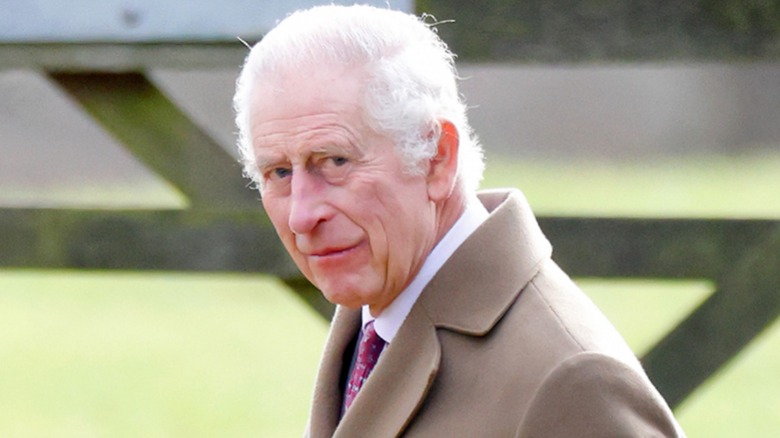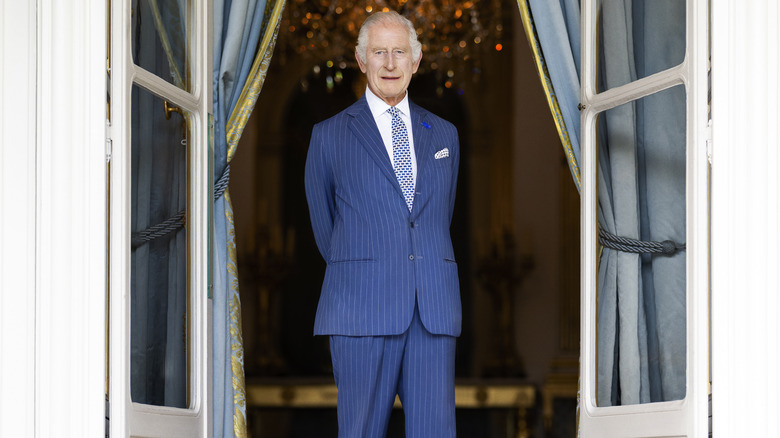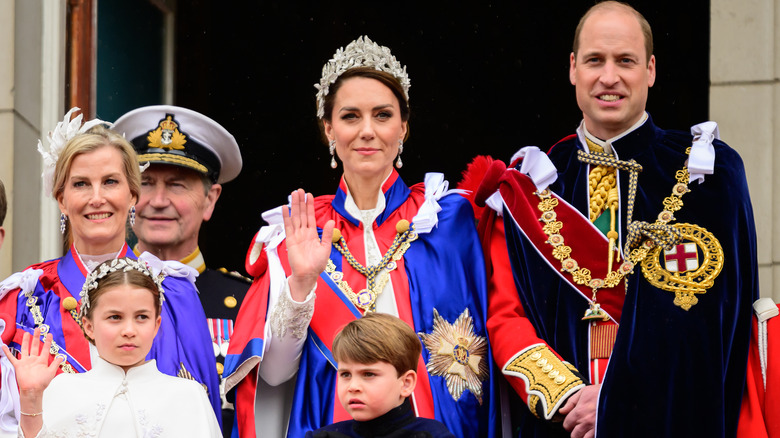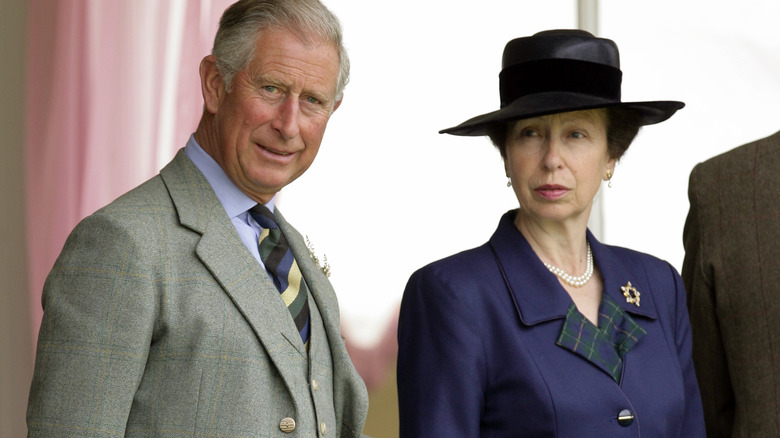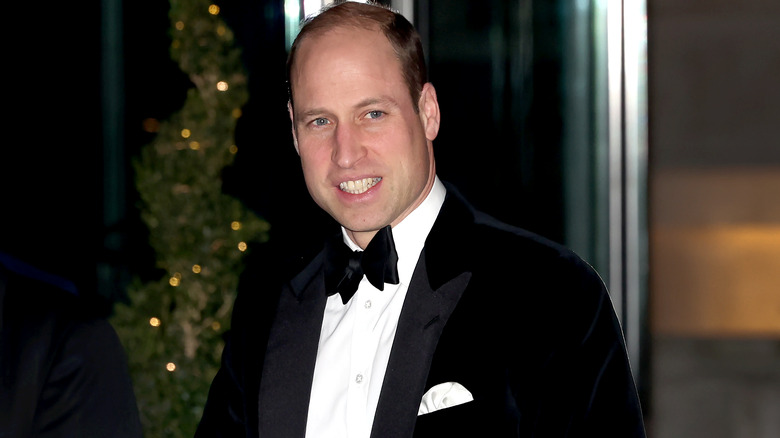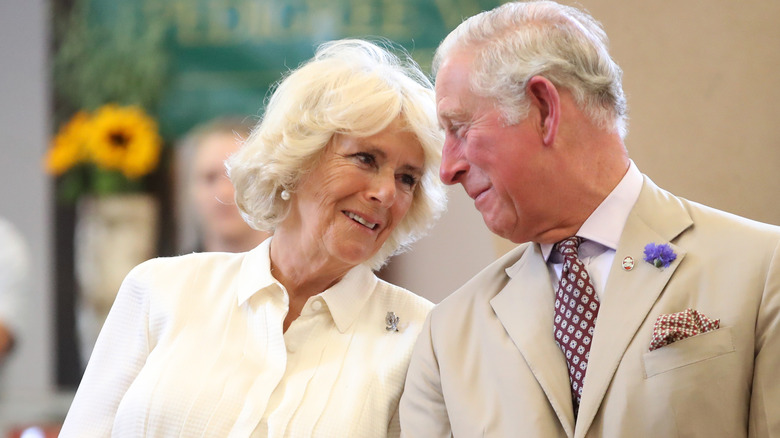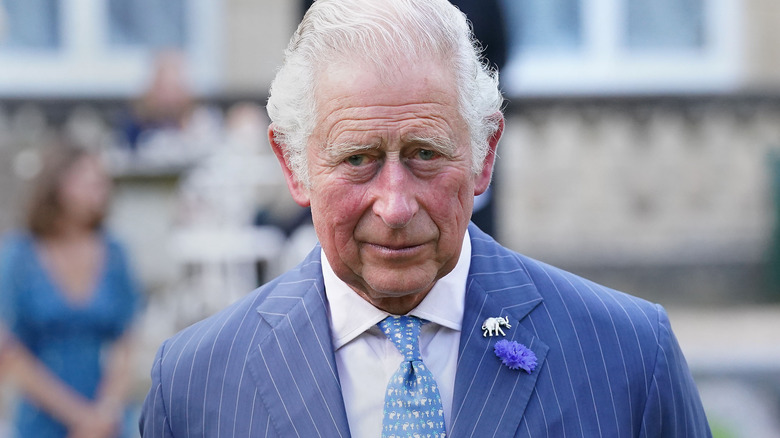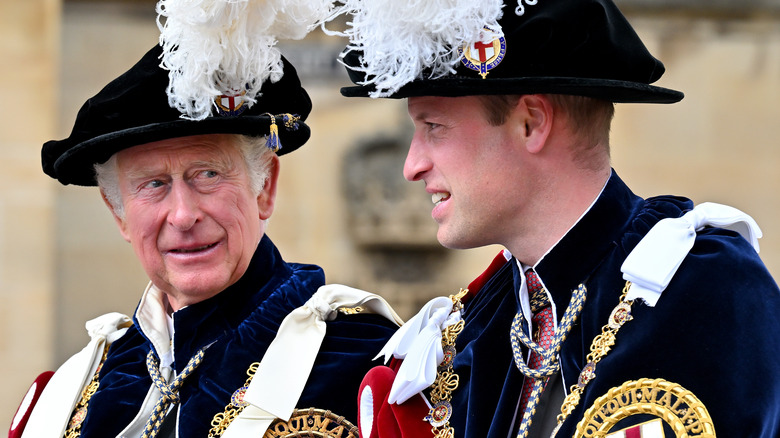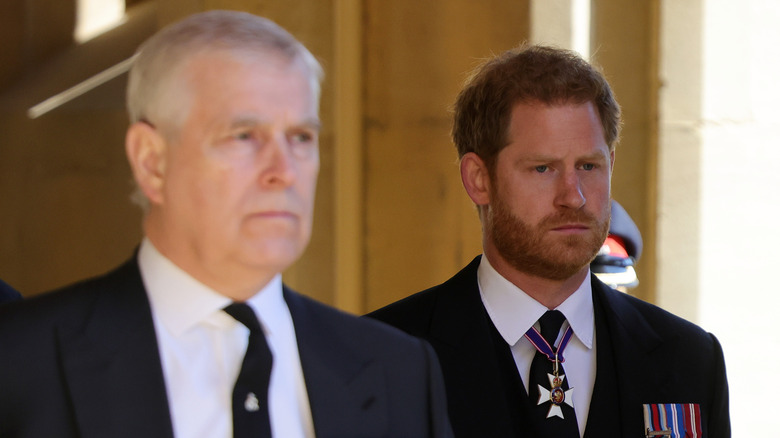All The Royal Protocols That May Be Followed Now That King Charles Announced His Cancer Diagnosis
King Charles III has been known for breaking some royal rules, but his most unprecedented move yet has been opening up to the public about his cancer diagnosis. Never in the history of the British monarchy has the sovereign so willingly disclosed their health issues. It's just not the way the palace rolls, if you will. "I think 20 years ago we would have got a very abrupt, short statement, and that's about it," former royal press secretary Simon Lewis explained during an interview with BBC Radio 4 (via U.S. News & World Report).
While the public doesn't know what kind of cancer the king has (except that it's not prostate cancer) or what kind of treatment he's undergoing, they know more about the king's health than they ever did about Queen Elizabeth II's. While the public was repeatedly told that the queen had mobility issues in the last years of her life, there were whispers that she had bone cancer.
In the historic statement released by Buckingham Palace, the institution said that "His Majesty has chosen to share his diagnosis to prevent speculation and in the hope it may assist public understanding for all those around the world who are affected by cancer." Given the state of the king's health, the palace will look to a slew of protocols — some more drastic than others and many dependent on the success of Charles' treatment.
Charles can delegate some – but not all – tasks to his Counsellors of State
With King Charles III stepping back from many of his duties, his Counsellors of State may be called upon to act. Counsellors of State, put simply, are individuals the king authorizes to perform some of his royal duties on his behalf, including attending Privy Council meetings and appointing new ambassadors. They can also sign certain documents. When it comes to more serious and drastic actions, like appointing a new prime minister, Counsellors of State still need to defer to the monarch.
Attending to matters regarding the Commonwealth also remains the monarch's responsibility, and even though Counsellors of State cannot dissolve Parliament, the king can bestow them with the power to do so. "The point of the Counsellors of State is that the business of government needs to continue. It's not something that would go on and on," author and royal correspondent Juliet Rieden told the Sydney Morning Herald.
Protocol dictates that the monarch's spouse and the four individuals who are next in line to the throne serve as Counsellors of State. In Charles' case, this would include Queen Camilla, Prince William, Prince Harry, Prince Andrew, and Princess Beatrice (William's children are excluded because they are not 21 yet). Considering Harry and Andrew were no longer serving as working royals upon Charles' ascension to the throne, the king successfully petitioned Parliament to amend the Regency Act of 1937 to include his sister, Princess Anne, and his brother, Prince Edward.
In the past, Counsellors of State have been called upon to act
While Counsellors of State have authorization over certain matters, they don't always need to exercise their temporary power in the monarch's absence — it all depends on whether or not there are any duties for them to attend to. In some cases, they might not need to deviate from their normal royal duties at all. "Sometimes they acted, sometimes they didn't. It sort of just depended [on] what happened, what needed their attention," constitutional expert Craig Prescott told CBC.
If Charles calls upon his Counsellors of State to act, this wouldn't be unprecedented — Queen Elizabeth II did this on a few occasions, most notably when she started having health issues and couldn't fulfill certain royal duties. Speaking to Times Radio, constitutional expert Robert Hazel recalled a time when the queen had to forgo an event due to poor health. King Charles III, then the Prince of Wales, delivered his mother's speech in the House of Lords with Prince William supporting him.
"[Charles and William] had been appointed, jointly, as Counsellors of State to deliver the queen's speech on her behalf, and that was because of temporary incapacity," Hazel explained. Additionally, constitutional historian Daniel Brittain told TalkTV that it's protocol for the monarch to appoint Counsellors of State when they are out of the country to ensure that they can keep things running smoothly. In Charles' case, his selected Counsellors of State can step in to fulfill select duties while he receives cancer treatment.
Other members of the royal family may be asked to step in
In a statement, Buckingham Palace announced that King Charles III will be pausing some of his public royal duties for the time being in order to receive treatment for his cancer. But what happens when the monarch can't show up to his own royal engagements? Well, just like the vice president would step in if the president of the United States were to fall ill, the senior members of the royal family will "pick up the slack," as royal commentator Caroline Aston put it during an interview with TalkTV. And it doesn't necessarily have to be members who are appointed as Counsellors of State — depending on the type of engagement, any of the palace's working royals could step in. "His wife [Queen Consort Camilla] will absorb some of the duties," Aston explained, adding that Princess Anne will most definitely play a key role when it comes to ensuring her brother's engagements are taken care of.
Aston also expects that Prince William, Sophie, the Duchess of Edinburgh, and Prince Edward will all do their part to ensure things continue to run smoothly. "There will be some rapid change going on, but the Windsors are nothing if not adaptable in emergency situations," Aston said. With Princess Catherine down for the count after unspecified abdominal surgery, it's expected that Camilla, Anne, and Sophie will be at the forefront (especially since William has announced that he's taking time off to support his wife and children).
If Charles is out of action for the long term, a regent will be appointed
King Charles III's Counsellors of State can assist the monarch during his cancer treatment; however, a more permanent provision also exists. If Charles were to appoint a regent, this would signal that the monarch is incapable of fulfilling his duties in the long term.
This royal protocol will only take effect if Charles' cancer treatment does not go as planned and his condition significantly worsens — something we all hope will not happen. "A regency is only necessary if the monarch is completely incapacitated, either mentally or physically," constitutional historian Daniel Brittain told TalkTV. While Counsellors of State can fulfill some of the king's duties in the short term, they cannot continue in this manner indefinitely.
The regency protocol, as dictated by the Regency Act of 1937, specifies that the royal next in line to the throne becomes the regent if the monarch is no longer able to rule — given that they live in the U.K., are 18 years or older, and haven't adopted the Catholic faith. "William is next in line, so I think it's absolutely appropriate that William steps up, if need be, as Counsellor of State and, if need be, as regent," University of Sydney historian Cindy McCreery told the Sydney Morning Herald.
Certain protocols need to be followed before a regent can be instated
Instating a regent assures that the monarchy can continue to function as normal even when its monarch is incapacitated; however, various protocols need to be followed before the Regency Act can come into play. For starters, a select group of people – the monarch's spouse, the Lord Chancellor, the Lord Chief Justice of England and Wales, the Speaker of the House of Commons, and the Master of the Rolls – will need to review the monarch's ability to rule. Before a regent can be appointed, three of these five people must agree that the monarch is unfit to rule. This means that, even if the monarch opposes the signing of the act, there is nothing they can do if the majority of this group decides that it's necessary to do so.
"The monarch can't, for example, insist that they can remain as monarch if it's clear to their doctors and senior members of the royal family that [they can't]," University of Sydney historian Cindy McCreery explained to the Sydney Morning Herald. "There is absolutely a mechanism for assuring the public and assuring the country or the Commonwealth even that the head of state is competent to stay in that role." Once the Regency Act goes into effect, the monarch-in-waiting — in this case, Prince William — would become the regent.
Since its inception, the Regency Act has never been implemented
While there is plenty of talk about the Regency Act at the moment because of King Charles III's cancer diagnosis, it's interesting to note that, since its establishment in 1937, the act has never been implemented. The only monarch who had a regent was King George III, who ruled long before the Regency Act was established. His son, Prince George IV (later King George IV), ruled in his stead after the king developed a mental health condition that rendered him incapable of fulfilling his duties as monarch, constitutional expert Robert Hazel explained to Times Radio.
While Queen Elizabeth II did take ill a couple of times before her death, a regent was never appointed because she was still able to perform most of her royal duties. This might very well be the same case with King Charles, unless he becomes so ill that he's completely incapacitated, in which case Prince William will have to take over.
"If [William] becomes regent, he effectively becomes the monarch in everything but name," Hazel explained. He added that he wouldn't be at all surprised if William has already started to handle some state-related matters behind the scenes as the monarch-in-waiting "as part of a very gradual handover." Hazel also pointed out that no law prevents William from taking on some of the monarch's duties, like meeting with the prime minister. "Prince William could do that occasionally, or he could start to do it permanently without necessarily a regency having been declared," Hazel said.
If the king's health continues to decline, abdication could be the next step
If King Charles III becomes incapacitated in the long term, the monarchy might find itself in abdication territory. Of course, this will only occur in the most extreme of circumstances. "I imagine that if he is so sick that he can't read papers and see the prime minister for that length of time then he would step to one side," author and royal correspondent Juliet Rieden told the Sydney Morning Herald. Other royal experts aren't warming to this idea, however.
"It'll happen 10 minutes after hell freezes over," Majesty Magazine editor Joe Little told USA Today. "Charles has waited so long to be king, considering how long his mother lived and ruled, and now this [the cancer diagnosis] has befallen him (less than) two years into his reign. He's stoic. He will carry on," Little added. Royal expert Carolyn Harris agrees, saying that Charles' parents set the example by continuing royal duties until the end of their lives.
Of course, should Charles decide to abdicate, it would be the first time in modern history a king has decided to do so (the last monarch who abdicated the throne was King Edward VIII in 1936). It would also be an incredibly complex process because all 14 Commonwealth realms' prime ministers would have to give their consent. Harris says this is thanks to a statute that dictates that the king can't make changes to the monarchy without the Commonwealth's stamp of approval.
Another regent would be appointed if William were to also become incapacitated
King Charles III's cancer diagnosis has sparked plenty of speculation about what might happen if he's no longer able to rule. Surprisingly, some royal experts have brought up the possibility that, should Prince William become regent, or even king, and become incapacitated as well, the regency would fall to his younger brother, Prince Harry, given that Prince George is still under the age of 18. It's no secret that Harry's no longer a working member of the family, but his succession to the throne is a birthright, which means, despite all the drama that has gone down between him and the royal family, his claim to the throne remains unless Parliament passes an act to strip him of this right.
Speaking to TalkTV, constitutional historian Daniel Brittain explained that, technically, William's successor would be Prince Andrew, because Harry no longer lives in the U.K. Interestingly, Andrew's biographer, Nigel Cawthorn, told The Daily Beast that Andrew vied for regency in the past. "Andrew tried to push Charles out of the way during the Diana scandal. As Charles' popularity plummeted, Andrew lobbied the palace to install him as a regent for William," he said. "That has created friction between them which persists to this day."
If Harry did move back home, however, the role of regent would fall to him, according to the Regency Act. Whether this is something Harry would do is another story entirely. "I think Prince Harry did actually make it very, very clear that he wanted no part in traditional royal life," royal expert Carolyn Aston told TalkTV. "He's domiciled over in America."
